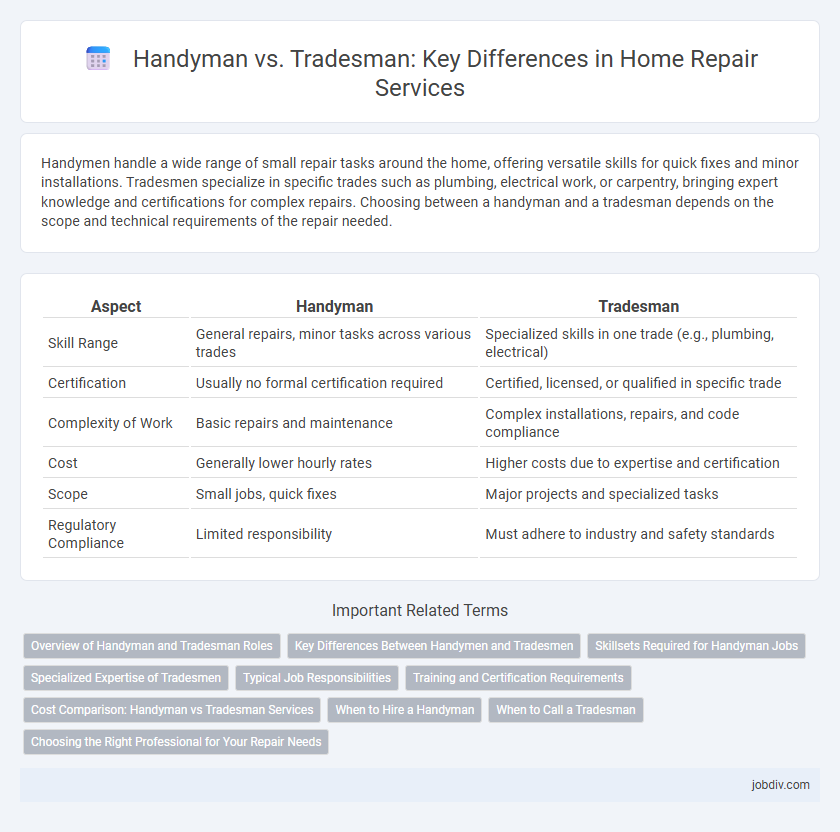Handymen handle a wide range of small repair tasks around the home, offering versatile skills for quick fixes and minor installations. Tradesmen specialize in specific trades such as plumbing, electrical work, or carpentry, bringing expert knowledge and certifications for complex repairs. Choosing between a handyman and a tradesman depends on the scope and technical requirements of the repair needed.
Table of Comparison
| Aspect | Handyman | Tradesman |
|---|---|---|
| Skill Range | General repairs, minor tasks across various trades | Specialized skills in one trade (e.g., plumbing, electrical) |
| Certification | Usually no formal certification required | Certified, licensed, or qualified in specific trade |
| Complexity of Work | Basic repairs and maintenance | Complex installations, repairs, and code compliance |
| Cost | Generally lower hourly rates | Higher costs due to expertise and certification |
| Scope | Small jobs, quick fixes | Major projects and specialized tasks |
| Regulatory Compliance | Limited responsibility | Must adhere to industry and safety standards |
Overview of Handyman and Tradesman Roles
Handyman roles typically involve performing a wide range of general repair and maintenance tasks across plumbing, electrical, carpentry, and painting, offering flexible and cost-effective solutions for minor household issues. Tradesmen specialize in specific skilled trades such as electricians, plumbers, or carpenters, requiring formal training, certification, and adherence to industry standards to handle complex projects and code-compliant installations. Choosing between a handyman and a tradesman depends on the job complexity, with handymen suited for small repairs and tradesmen essential for specialized or regulated tasks.
Key Differences Between Handymen and Tradesmen
Handymen handle a wide range of minor home repairs and maintenance tasks, offering versatility and flexibility without specialized licensing. Tradesmen possess certified skills and expertise in specific fields such as plumbing, electrical work, or carpentry, ensuring compliance with industry standards and safety regulations. Key differences include the scope of work, required certifications, and the complexity of tasks they are legally permitted to perform.
Skillsets Required for Handyman Jobs
Handyman jobs require a broad skillset including basic plumbing, electrical work, carpentry, painting, and general maintenance tasks, enabling them to handle a variety of household repairs efficiently. Unlike tradesmen who specialize in a specific trade such as plumbing or electrical engineering, handymen must possess versatility and adaptability to troubleshoot and fix multiple issues. Strong problem-solving abilities, basic tool knowledge, and a comprehensive understanding of safety protocols are essential skills for successful handyman work.
Specialized Expertise of Tradesmen
Tradesmen possess specialized expertise backed by formal training and certifications in fields such as plumbing, electrical work, or carpentry, ensuring high-quality and code-compliant repairs. Handymen typically handle a wide range of general maintenance tasks but may lack the in-depth knowledge required for complex, technical projects. For specialized repairs that demand precision and compliance with industry standards, hiring a tradesman provides greater reliability and safety guarantees.
Typical Job Responsibilities
Handymen typically handle general home maintenance tasks such as minor plumbing, electrical repairs, painting, and fixing appliances, aiming to address small-scale issues efficiently. Tradesmen focus on specialized work requiring formal training and certifications, including electrical wiring, plumbing systems, carpentry, or HVAC installations, ensuring adherence to safety codes and standards. While handymen offer versatility for routine repairs, tradesmen provide expert solutions for complex and technical projects.
Training and Certification Requirements
Handyman roles typically require basic training and may only need general certifications such as first aid or safety courses, enabling them to perform a wide range of minor repairs and maintenance tasks. Tradesmen undergo formal apprenticeships and obtain specific certifications and licenses in specialized fields like plumbing, electrical work, or carpentry to meet legal and industry standards. Certification requirements for tradesmen are often regulated by local or national authorities, ensuring a higher level of expertise and compliance for complex repairs.
Cost Comparison: Handyman vs Tradesman Services
Handyman services typically cost less than tradesman services due to the broader range of general tasks handled without specialized licensing. Tradesmen, such as electricians or plumbers, often charge higher rates reflecting their certifications, expertise, and adherence to regulatory standards. Comparing average hourly rates, handyman fees range from $40 to $60, while tradesmen can charge $70 to $120 or more, depending on the complexity of repairs.
When to Hire a Handyman
Hire a handyman for small-scale repairs, maintenance tasks, and minor installations that require a broad skill set but not specialized expertise. Tasks such as fixing leaky faucets, patching drywall, or assembling furniture fit a handyman's versatile capabilities. For complex projects involving electrical, plumbing, or structural work, a tradesman with specific certifications is the better choice.
When to Call a Tradesman
Call a tradesman when specialized expertise is required for complex repairs involving electrical wiring, plumbing, or structural work that demands certification and compliance with safety codes. Unlike handymen, tradesmen possess licensed training and experience for handling technical tasks such as installing HVAC systems, fixing gas lines, or performing major renovations. Engaging a tradesman ensures adherence to legal standards, reduces risk, and guarantees high-quality, durable repairs on critical home systems.
Choosing the Right Professional for Your Repair Needs
Choosing the right professional for your repair needs involves understanding the difference between a handyman and a tradesman. A handyman offers versatile, general repair skills suitable for small to medium household tasks, while a tradesman possesses specialized training and certifications for complex, industry-specific repairs like electrical, plumbing, or carpentry work. Selecting the appropriate expert ensures the job is completed efficiently, safely, and up to code, minimizing risks and potential costs.
Handyman vs Tradesman Infographic

 jobdiv.com
jobdiv.com